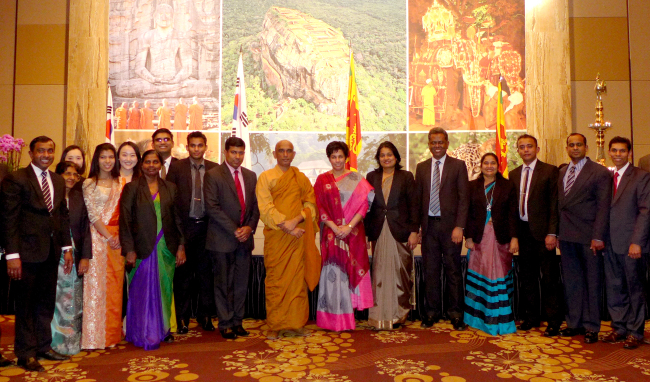The Sri Lankan Embassy held a National Day reception in early February to celebrate the 68th anniversary of independence from Britain and the development of ties with Korea.
While Sri Lanka has made significant progress as a democracy, the country also had to face “formidable challenges, including a conflict that ravaged the nation for three decades,” said Sri Lankan Ambassador to Korea Manisha Gunasekera in a speech.
Located in the Indian Ocean, the lush, tropical island nation overcame a civil war with the Liberation Tigers of Tamil Eelam, a militant organization that tried to establish an independent state in northern and eastern Sri Lanka for the Tamil people.
The new national unity government of President Maithripala Sirisena and Prime Minister Ranil Wickremesinghe came to power last year, with the mandate to address historical grievances and reconcile divided groups.
While Sri Lanka has made significant progress as a democracy, the country also had to face “formidable challenges, including a conflict that ravaged the nation for three decades,” said Sri Lankan Ambassador to Korea Manisha Gunasekera in a speech.
Located in the Indian Ocean, the lush, tropical island nation overcame a civil war with the Liberation Tigers of Tamil Eelam, a militant organization that tried to establish an independent state in northern and eastern Sri Lanka for the Tamil people.
The new national unity government of President Maithripala Sirisena and Prime Minister Ranil Wickremesinghe came to power last year, with the mandate to address historical grievances and reconcile divided groups.

“Today Sri Lanka stands as a proud nation that successfully defeated the forces of conflict and established lasting peace,” the newly appointed envoy stressed. “Our nation is engaged in a transparent process of bringing durable peace and reconciliation to all our people. We have taken judicial reforms to get rid of corruption.”
Sri Lanka and Korea will celebrate 40 years of diplomatic ties next year. In light of deepening bilateral relations, Korea has become “a prime country with which to consolidate our economic ties,” she indicated, adding that three direct flights weekly between Seoul and Colombo since 2013 have facilitated people-to-people links.
The event at Millennium Seoul Hilton attracted more than 40 ambassadors and several Korean diplomats, including Deputy Minister for Multilateral and Global Affairs Shin Dong-ik, who in a speech said the international community had witnessed the South Asian nation’s “unwavering commitment to democracy” through last year’s two elections.
“Sri Lanka today is undertaking a wide range of initiatives to facilitate national reconciliation and good governance, including a 100-day reform program,” he highlighted. “It is also in the process of drawing up a new constitution. These efforts will lay a solid foundation for Korea’s economic participation in Sri Lanka.”
The Korean diplomat said the two countries had made great strides in strengthening their relations, buttressed by two-way trade that increased 34-fold from $28 million in 1977 to $400 million last year. Korea has become a major source of investment for Sri Lanka helping create some 4,000 jobs, and Korea’s Saemaul Undong agricultural reform movement has revitalized Sri Lanka’s rural areas and infrastructures, he said.

In recent years, Sri Lanka -- known as the “Pearl of the Indian Ocean” -- has become an international tourism hot spot, attracting over 2 million visitors last year. Arab, Portuguese, Dutch and British influences have left indelible traces on the country‘s landscape, which has eight UNESCO World Heritage Sites, 15 national parks, 350 waterfalls, large tea estates and botanical gardens. Korean tourists have risen over threefold since 2010 to nearly 14,400 last year.
According to Joseph Stiglitz, Nobel laureate in economics and professor at Columbia University, fully integrating the minority Tamils into the country’s economic life through “balanced affirmative action programs” is needed, along with significant investment in infrastructure, education, health and technology in the northern Tamil region.
In an article, Stiglitz noted that Sri Lanka’s “21st century development strategy” would entail moving directly into technologically advanced sectors, high-productivity organic farming and higher-end tourism.
“Sri Lanka, beautiful and ideally located in the Indian Ocean, is in a position to become an economic hub for the entire region -- a financial center and a safe haven for investment in a geopolitically turbulent part of the world,” he said.
“But this won’t happen by relying excessively on markets or underinvesting in public goods. Fortunately, with peace and the emergence of representative political institutions, Sri Lanka today has a better opportunity than ever to make the right choices.”
By Joel Lee (joel@heraldcorp.com)
-
Articles by Korea Herald







![[KH Explains] Hyundai's full hybrid edge to pay off amid slow transition to pure EVs](http://res.heraldm.com/phpwas/restmb_idxmake.php?idx=644&simg=/content/image/2024/04/18/20240418050645_0.jpg&u=20240419100350)







![[From the Scene] Monks, Buddhists hail return of remains of Buddhas](http://res.heraldm.com/phpwas/restmb_idxmake.php?idx=652&simg=/content/image/2024/04/19/20240419050617_0.jpg&u=20240419175937)

![[KH Explains] Hyundai's full hybrid edge to pay off amid slow transition to pure EVs](http://res.heraldm.com/phpwas/restmb_idxmake.php?idx=652&simg=/content/image/2024/04/18/20240418050645_0.jpg&u=20240419100350)

![[Today’s K-pop] Illit drops debut single remix](http://res.heraldm.com/phpwas/restmb_idxmake.php?idx=642&simg=/content/image/2024/04/19/20240419050612_0.jpg&u=)